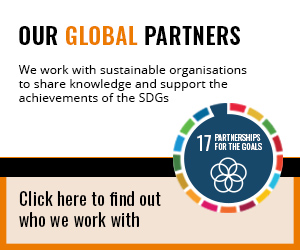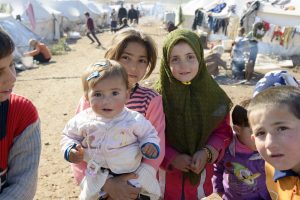17GlobalGoals guest blogger, Andy Ashworth makes a pleas for holistic and pragmatic thinking when it comes to implementing the 17 Global Goals.
In this series of observations about the operational side of the Global Goals, the idea is to take a look at how the Goals affect life on the ground.
The Goals themselves operate at a stratospheric height from the “grass roots”. They are set out in the offices of the United Nations; some distance away from the everyday practical efforts to get closer to the aims and objectives that they are advocating for. This is necessary and I don’t see any practical way of things being done any differently.
In the way that a pair of binoculars can be used to view faraway things, a platform such as this enables a glimpse into the micro-environment of everyday development work.
What I would like to look at in this post is some of the tensions that exist within the connections between the goals. The intention is not to be critical, but more to take a look at some of the real difficulties that face the people who set the Goals; it almost looks like an impossible task they have.
Specifically, I would like to take a look at the operational relationships between the Goals themselves.
Individually, all of the goals are absolutely morally and ethically right. I don’t think we can argue against the eradication of poverty for example, or peace, justice and strong institutions. In some ways, the Goals are an aspirational picture of a recipe for a fair and just world.
Taking the rightness of aspiration as a given, there are relationships between the goals that are in tension. I would like to give an example.
Goals 1 and 2 are about eradicating poverty and hunger, and focus on the policy frameworks to support accelerated investment. Goal 2 references agricultural productivity and sustainable food production.
Goal 4, quality education, refers to children having access to pre-primary, primary, and secondary education. IN addition there is further reference to “substantially increasing relevant skills for employment, decent jobs, and entrepreneurship.”
So far so good. If we now skip to Goal 8, decent work and economic growth, we see a reference to “substantially reducing the proportion of youth not in employment, education, or training.”
This all joins up, and as an aspirational picture looks good. It is worth mentioning at this point that these targets are aimed at 2030 with milestones in 2020.
So what is the point I am trying to make?
In 2017, and again in 2019, I toured around some of the more rural areas of Malawi and had a number of conversations with various people. The majority of the population of Malawi are rural-based, subsistence farmers, or they eke out a living from Lake Malawi, fishing or running small boats, with a number running very small businesses.
As I talked to people up and down the lake, I heard a familiar story. Rural areas are served by centralised schools. Children who attend school at all, often travel significant distances to attend.
But while school access has increased, I was told by a number of people that they were losing faith in the education system.
The model seems to be that pupils work really hard to become educated in the hope that they can go to one of the three cities, get a good job, and remit income to their families. Their families are fully supportive of this as a plan.
The trouble is that out of thousands of rural children, a very small proportion are successful enough to travel to the city with decent prospects. Out of that very small proportion, most arrive in the city to find that there are very few jobs and competition for those few jobs is extremely stiff. In fact, there are people with degrees selling fish on street corners or working as security guards.
These people will normally live in overpopulated townships in very difficult conditions barely managing to make ends meet. They are often barely in a position to keep themselves, never mind a family at home.
Meanwhile back at the village, all of the children that are in the education system, are working hard to succeed in a curriculum that is geared to employment but has little relevance to the subsistence living that they have been brought up with.
Some of the older generation were saying that their children may have had an education, but they were seeing no benefit, that the brightest and best of their communities had left and would probably never return.
They were telling me that the young people were too busy to learn to fish or farm, and most of them didn’t want to as they had had their aspirations raised that they would find employment and a different lifestyle.
What we were seeing was a skills-drain. At school they couldn’t learn sustainable agriculture, or sustainable fishing, or renewable technologies, they were training for jobs that don’t currently exist.
The nature of food production in Malawi is critical. It is a densely populated country with relatively little spare land for food production and is particularly vulnerable to climate change. There were two bad years recently, in 2015 and 2016, after an El Nino event, and food security was severely compromised.
The disconnect between the Global Goals for education, and the Goals relating to poverty and food security are significant.
In pursuing them in a disconnected way, educational outcomes may be really substantial and progress good. But they may have a negative effect on for instance agriculture, and in turn, hunger.
If there was sustained emphasis on vocational education, that would certainly make a difference, but these current tensions will have the effect of slowing down progress within the existing direction of travel. 2030 is really not that far away.
This is just one example and there are others. Capacity building needs to be joined up if unintended consequences are to be managed.
In my day-job, we have had five years’ experience of running a vocational based training programme, with encouraging results. However, it would never be ratified by government as the curriculum is dictated by the student’s home village and the skills-gaps that exist there.
An audit of the home environment is a first step to training and takes place early. Maybe there’s still a discussion possible on the purpose of the education system, but we need to be quick; skills disappear forever if not passed on and you can’t eat a certificate.
This is not a criticism, but it is a practical view of what policy means at ground level. I don’t think that these are problems just for developing countries to ponder. We have our own questions to answer about the purpose of our education systems and what they are preparing young adults for. It is relevant for everybody to think about our individual abilities to react to change. That is being tested as I write.
Until next time. Andy






